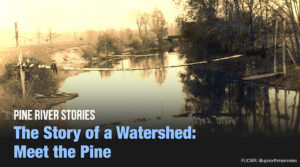
By Carrie La Seur,
Legal Director —
The Pine River. It’s a name that ought to conjure up images of cool water riffles, children splashing on a hot day, the voices of kayakers carrying over the water, maybe a trout rising to a fly. But going on two decades now, since 2005, it’s been off-limits for swimming. Not because of some natural disaster or even legacy toxic contamination, mind you, but because of something far more troubling: E. coli.
Yes, that E. coli. We hear about it in the news, usually connected to a food recall, an outbreak linked to undercooked burgers or spinach that wasn’t washed quite right. And that’s bad enough. But here in Michigan, it’s not just in our food, it’s in our rivers, coursing downstream from the factory farms that dot the watershed. The rain falls, the snow melts, and it washes raw livestock sewage — fertilizer, they call it — straight into our waterways.
You don’t have to be a scientist to wonder if that might be a problem for more than just swimming. What about fishing? What about the folks who still cast a line into the Pine, hoping for a bit of quiet recreation, a connection to the natural world?
A study from 2020, conducted by scientists at Alma College and the University of Toronto, working with dedicated locals from the Healthy Pine River group, gives us a pretty clear answer. They did a simple, elegant experiment. They took some clean, hatchery-raised fish and put them in cages right in the river. It’s a bit like a fishy version of Survivor, only the challenge wasn’t building a shelter or winning a tribal council, it was surviving the onslaught of E. coli. And, sadly, they didn’t. They all got colonized by the bacteria.
Then the scientists did what any good scientist would do: they checked the local fish, the ones who actually call the Pine River home. They fished from the shore, they fished from boats, and they swabbed their catch. And what they found confirms our worst fears: the local fish carried E. coli too, especially those in the shallows near shore.
But the real kicker, the part that should make us all sit up and take notice, is what they found on anglers’ hands. Clean before they started, but after handling the fish, after even just touching the river water—E. coli. It’s a silent, invisible hitchhiker, clinging to the scales, the slime, the fishing line, and then, your hands and everything you touch.
Some E. coli are harmless, part of our gut biome. But other strains can cause real trouble: diarrhea, stomach cramps, nausea, fever. And in the worst cases, especially for the very young and the old, it can lead to much more serious complications: UTIs, pneumonia, sepsis, even kidney failure. This study didn’t identify the specific strains in the Pine, but other studies have found antibiotic-resistant bacteria there, which is an even bigger worry.
What do we do? Do we give up on the river entirely? No. We fight for it. We demand better. We insist that these factory farms take responsibility for the mess they’re making. This isn’t just about fish, it’s about our health, our communities, our connection to the natural world.
But more than individual precautions, we need collective action. We need to put pressure on our elected officials to regulate factory farms, to enforce stricter environmental standards, to protect our rivers and streams. This isn’t just about the Pine River, it’s about rivers and streams across the country, all fighting the same battle and losing ground every day.
We can’t let our rivers become open sewers for industrial agriculture. We need to stand up, speak out, and demand a cleaner, healthier future. The fish, the rivers, and our own health depend on it.
Here are some immediate steps
we can all take to stay safe:
- Wash your hands. Thoroughly. This is the most basic, but most crucial step. Soap and water, after handling fish, after being near the river. Hand sanitizer is a good backup.
- Be careful cleaning your catch. If you’re eating the fish, be extra vigilant. Wash everything: hands, cutting boards, knives. And cook the fish properly.
- Consider gloves. If you’re concerned, wearing gloves while fishing and cleaning fish is a sensible precaution.
Read more from this series:

The Story of a Watershed: Meet the Pine

Hook, line, and contaminated: Study reveals dangerous E. Coli levels

Episode 3 // The Pine River Stories: A little frank talk about E. Coli, fish, and the mess we’re in

Episode 2 // The Pine River Stories: The Pine River remembers all


Very informative and thought provoking articles. Thank you.